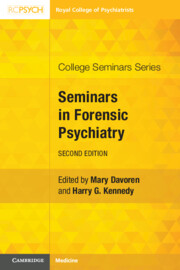Book contents
- Seminars in Forensic Psychiatry
- College Seminars Series
- Seminars in Forensic Psychiatry
- Copyright page
- Contents
- Contributors
- Foreword
- Introduction
- Chapter 1 Violence and Mental Disorder
- Chapter 2 Violence and Mental Disorder
- Chapter 3 Outcomes from the Key Inquiries and the Evolution of Modern Forensic Psychiatry
- Chapter 4 Prison Psychiatry
- Chapter 5 Legal Issues and Expertise in Forensic Psychiatry
- Chapter 6 Expertise, Structured Professional Judgement and Risk Assessment
- Chapter 7 Models of Care in Forensic Psychiatry
- Chapter 8 Psychopharmacology of Chronic Aggression and Violence in Forensic Settings
- Chapter 9 Ward Milieu and the Management of In-Patient Violence
- Chapter 10 Community Forensic Psychiatry Including Liaison with Health, Criminal Justice and Public Protection Agencies
- Chapter 11 Assessment of Personality Disorder, Psychopathy and Associated Offending Behaviour
- Chapter 12 Stalking and Threats to Harm and Kill
- Chapter 13 Sexual Offending
- Chapter 14 Terrorism-Related Assessments
- Chapter 15 Forensic Psychotherapy and Psychological Therapies in Forensic Mental Health Settings
- Chapter 16 Forensic Aspects of Medical Negligence
- Chapter 17 Child and Adolescent Forensic Mental Health Services
- Chapter 18 Women’s Services in Forensic Psychiatry
- Chapter 19 Forensic Psychiatry and Intellectual Disability
- Chapter 20 Cultural Service Delivery in Forensic Mental Health Services
- Chapter 21 Tackling Ethnic Inequality in Forensic Mental Healthcare
- Chapter 22 Academic Forensic Psychiatry
- Chapter 23 The No-Nonsense Guides
- Index
- References
Chapter 22 - Academic Forensic Psychiatry
Published online by Cambridge University Press: aN Invalid Date NaN
- Seminars in Forensic Psychiatry
- College Seminars Series
- Seminars in Forensic Psychiatry
- Copyright page
- Contents
- Contributors
- Foreword
- Introduction
- Chapter 1 Violence and Mental Disorder
- Chapter 2 Violence and Mental Disorder
- Chapter 3 Outcomes from the Key Inquiries and the Evolution of Modern Forensic Psychiatry
- Chapter 4 Prison Psychiatry
- Chapter 5 Legal Issues and Expertise in Forensic Psychiatry
- Chapter 6 Expertise, Structured Professional Judgement and Risk Assessment
- Chapter 7 Models of Care in Forensic Psychiatry
- Chapter 8 Psychopharmacology of Chronic Aggression and Violence in Forensic Settings
- Chapter 9 Ward Milieu and the Management of In-Patient Violence
- Chapter 10 Community Forensic Psychiatry Including Liaison with Health, Criminal Justice and Public Protection Agencies
- Chapter 11 Assessment of Personality Disorder, Psychopathy and Associated Offending Behaviour
- Chapter 12 Stalking and Threats to Harm and Kill
- Chapter 13 Sexual Offending
- Chapter 14 Terrorism-Related Assessments
- Chapter 15 Forensic Psychotherapy and Psychological Therapies in Forensic Mental Health Settings
- Chapter 16 Forensic Aspects of Medical Negligence
- Chapter 17 Child and Adolescent Forensic Mental Health Services
- Chapter 18 Women’s Services in Forensic Psychiatry
- Chapter 19 Forensic Psychiatry and Intellectual Disability
- Chapter 20 Cultural Service Delivery in Forensic Mental Health Services
- Chapter 21 Tackling Ethnic Inequality in Forensic Mental Healthcare
- Chapter 22 Academic Forensic Psychiatry
- Chapter 23 The No-Nonsense Guides
- Index
- References
Summary
Forensic psychiatry, of all the specialties in medicine, needs its own strong academic core. Academic forensic psychiatry is founded in scientific research, with its systematic approach to making and recording observations, formulating hypotheses from them, testing those hypotheses with new observations and accumulating the most comprehensive picture possible in a way that is transparent and replicable. An academic approach supports application of scientific principles as strongly in the individual case as in developing relevant collective knowledge, is able to make links between them and can communicate all this effectively within and outside the specialty. This requires highly developed and defined specialist training. Academic forensic psychiatry in this sense is the business of all forensic psychiatrists. In order for forensic psychiatry to thrive, however, it is vital that some forensic psychiatrists further specialise in academic work in terms of additional training, time and immersion in skills that support accurate scientific questioning and testing and, ultimately, the capacity to innovate and keep this cycle active.
- Type
- Chapter
- Information
- Seminars in Forensic Psychiatry , pp. 434 - 447Publisher: Cambridge University PressPrint publication year: 2024
References
References
R v Ivor Bell [2019] NICC 20. Ref: OHA11086
R v Clark [2003] RWCA Crim 1020
R v Cleland [2020] EWCA Crim 906
R v Edwards [2018] EWCA Crim 595
R v Fisher [2019] EWCA Crim 1066, 2019 WL 02551700
R v Fuller [2016] EWCA Crim 1867
X v UK 7215/75 [1981] ECHR 6
R v Vowles; R (Vowles) v SSJ [2015] EWCA Crim 45, [2015] EWCA Civ 56 [2015]
Cases
R v Ivor Bell [2019] NICC 20. Ref: OHA11086
R v Clark [2003] RWCA Crim 1020
R v Cleland [2020] EWCA Crim 906
R v Edwards [2018] EWCA Crim 595
R v Fisher [2019] EWCA Crim 1066, 2019 WL 02551700
R v Fuller [2016] EWCA Crim 1867
X v UK 7215/75 [1981] ECHR 6
R v Vowles; R (Vowles) v SSJ [2015] EWCA Crim 45, [2015] EWCA Civ 56 [2015]



